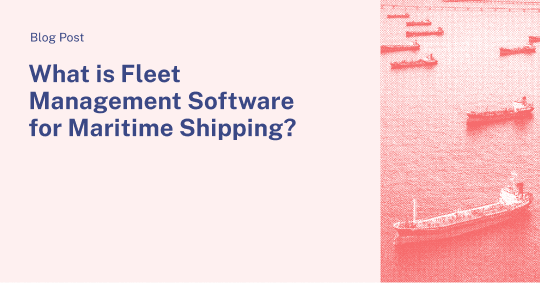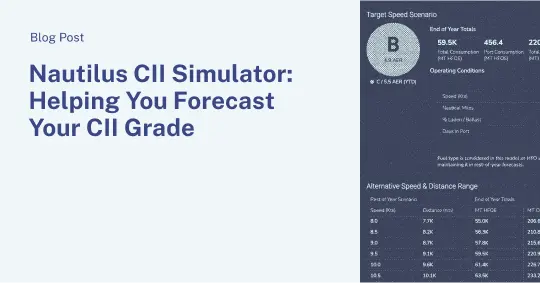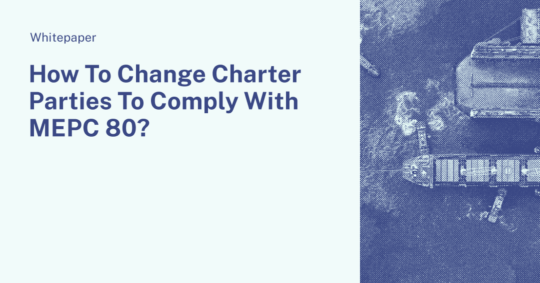Charter party agreements, in their current form, are often a stumbling block to owners and charterers collaborating on fleet optimization, cost reduction, and decarbonization. They are very old documents, built around archaic structures that are unsuitable for modern day shipping, and rife with clauses that impede stakeholder collaboration. In sum, charter parties are responsible for major inefficiencies in the ocean supply chain that result in excess carbon emissions, excess fuel consumption, and excess costs. Let us closely examine some problems with charter parties.
Charter parties are static
One of the causes behind the inefficiencies in time charter parties is the way that they are built based on static and narrow vessel descriptions that fail to account for the degradation of vessel performance over time. For charterers, this causes unmet performance expectations and difficulty making accurate financial forecasts, while owners face claims risks or may opt to understate vessel performance to mitigate these risks, resulting in missed profits for the vessel’s undervaluation. Static vessel descriptions benefit neither side and instead serve to promote mistrust and make it more difficult to build strong commercial relationships.
Charter parties impede market efficiency and emissions reduction
Among the challenges faced by owners and charterers, emissions regulations and taxation are growing in complexity and significance. However, static performance benchmarks create a significant challenge for reducing emissions and creating a low carbon supply chain. Adhering to the charter party requirements, with some variation depending on segment, may force charterers to operate voyages in an inefficient manner.
For example, take a clause compelling a charterer to go at a minimum speed. Contemporary technologies allow operators to simulate the optimal speed for a voyage, yet when this speed is outside of the range allowed within the charter party, compliance with the clause must take precedence. This leads to unnecessary fuel wastage through suboptimal arrivals and increased emissions. Consequently, the operator faces additional expenses for fuel and incurs extra carbon emissions, while the vessels’ Carbon Intensity Indicator (CII) scores decline more rapidly, hitting the head owner.
Charter parties set up an adversarial dynamic between owners and charterers
The structure of voyage charter parties, tied to cargo sales and demurrage clauses, incentivizes vessel operators to prioritize early arrival at port, even if it leads to excessive fuel consumption and emissions. This inefficient practice conflicts with emission reduction goals and negatively impacts vessel CII ratings. Time charter parties, on the other hand, often result in suboptimal speed due to split incentives and lack of direct fuel cost control for owners. Additionally, the binary claims-based approach in current charter party terms hinders collaboration and limits the potential for dynamic efficiency improvements. Overcoming these challenges requires reevaluating charter party frameworks – read more about this in our joint white paper with BIMCO.
Better collaboration between owners and charterers
The industry must dispense with old ways of working and leverage technology to find a new approach to charter parties, one that centers on collaboration and insight sharing and where incentives are built in to encourage win-win outcomes. With high-frequency sensors, stakeholders can now extract unparalleled insights into real-time vessel performance that can be leveraged to simulate the optimal technical (such as maintenance scheduling) and operational parameters for commercial and/or environmental goals. We must also embrace new legal frameworks built for emissions and fuel reduction such as virtual arrivals, dynamic speed options or simply just-in-time arrival.
A new charter party framework made possible with machine learning
Nautilus’s Green Charter™ enables collaborative CII management, dynamic fouling and performance clauses, just-in-time arrival, and dynamic speed voyage charter clauses. Green Charter uses machine learning-based data streams to implement new legal frameworks within charter party agreements and uses Nautilus Labs as an independent, shared source of truth between ship owners and charterers to improve transparency and collaboration.
With trust and transparency enabling joint decision making between owners and charterers, Green Charter realigns incentive structures between counterparties for strengthened commercial relationships. Read more about Green Charter in this one pager.
Better commercial and environmental outcomes for owners
Owners who adopt this technology and share vessel insights with their charterers will enjoy improved and longer-term relationships with their charterers, with a reduced exposure to claims.
With owner and charterer sharing technical and operation data on a chartered vessel, the counterparties can proactively agree on a mutually beneficial course of action rather than retroactively go to court over claims.
Such a collaborative approach helps to future-proof their portfolios and ensure the continued chartering of legacy tonnage. Additionally, Green Charter allows owners to position their companies as forward thinking, thus attracting new and more commercial opportunities.
Better commercial and environmental outcomes for charterers
With digital twins and simulations, charterers are equipped with the insights to accurately forecast performance from fuel expenditure, profit, emissions, and ETA. Large adjustments on actuals versus estimated voyage accounting is not only a cash flow inconvenience, it is effectively an inherent indicator that the voyage was not set up optimally either, as the wrong input was used. They will no longer have to spend lengthy amounts of time updating voyage accounting and managing claims, and can redirect their resources into marketplace priorities.
With insights into the emissions profile of the vessel, they will also gain the ability to manage and lower their Scope 3 emissions. This will improve their ESG profiles for better corporate reputation and regulations compliance.
If you would like to learn more about Green Charter, please reach out to us at sales@nautiluslabs.com.


